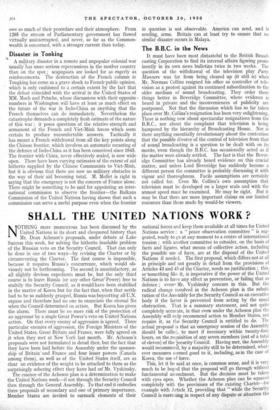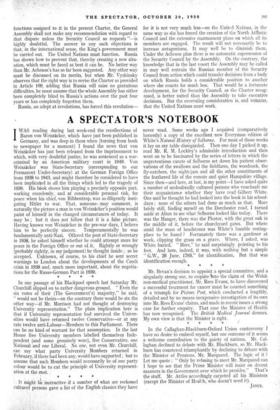SHALL THE UNITED NATIONS WORK ?
NOTHING more momentous has been discussed by the United Nations in its short and chequered history than Mr. Dean Acheson's proposals, under debate . at Lake Success this week, for solving the hitherto insoluble problem of the Russian veto on the Security Council. That can only be done in one of two ways—by revising the Charter or by circumventing the Charter. The first course is impossible, because it requires -Russia's concurrence, which would ob- viously not be forthcoming. The second is unsatisfactory, as all slightly devious expedients must be, but the only third course is to leave Russia (or any other Greats Power) free to stultify the Security Council, as it would have been stultified in the matter of Korea but for the fact that, when that nettle had to be so suddenly grasped, Russia was boycotting all U.N. organs and therefore had no one to enunciate the eternal No when the Council determined on action. But Korea has given the alarm. There must be no more risk of the protection of an aggressor by a single Great Power's veto on United-Nations action. On that every enemy of aggression is agreed. Three particular enemies of aggression, the Foreign Ministers of the United States, Great Britain and France, were fully agreed on it when they met at New York last month. Mr. Acheson's proposals were not formulated in detail then, but the fact that they have been laid before the Assembly under the sponsor- ship of Britain 'and France and , four lesser powers (Canada among them), as well as of the United States itself, are as Clear an evidence of the weight to be attached to them as the surprisingly sobering effect they have had orr Mr. Vyshinsky.
The essence of the Acheson plan is a determination to make the United Nations work—if not through the Security Council then through the General Assembly. To that end it embodies three proposals of secondary and one of primary importance. Member States are invited to earmark elements of their national forces and keep them available at all tithes for United Nations service ; a " peace observation committee " is sug- gested, ready to go at any moment to a centre of international tension • with another committee to consider, on the basis of facts and figures, what means of collective action, including the possible use of fo.rce, are at the disposal of the United Nations if needed. The first proposal, which differs not at all in principle and not greatly in detail from the provisions of Articles 43 and 45 of the Charter, needs no justification ; this, oetomething like it, is 'imperative if the power of the. United Nations is to have any effect as prevention, or failing that as defence ; even- Mr. Vyshinsky concurs in this. But the radical change involved in the Acheson plan is the substi- tution of the Assembly for\the Security Council as an executive body if the latter is prevented from acting by the usual obstruction. That is a summary statement, and not quite completely accurate, in that eves under the Acheson plan the Assembly will only- recommend action to Member States, not require it, as the Security Council is entitled to do. The a.ctual proposal is that an emergency session of the Assembly should be called, to meet if necessary within twenty-four hours, on therequisition of any seven members (out of a total of eleven) of the ecurity Council. Having met, tie Assembly would recommend, by a majority still to be determined, what- ever measures seemed good to it, including, as in the case of Korea, the use of force.
This, let it be said at once, is common sense, and it is very much to be hoped that the proposal will go through without fundamental amendment. But the decision must be taken with eyes open. Whether the- Acheson plan can be squared completely with the provisions of the existing Charter—for example with Article 12, providing that " while the Security Council, is exercising in respect of any dispute or situation the functions assigned to it in the present Charter, the General Assembly shall not make any recommendation with regard to that dispute unless the Security Council so requests "—is highly doubtful. The answer to any such objections is that, in the international sense, the King's government must be carried out. The United Nations must function. Russia has shown how to prevent that, thereby creating a new situ- ation, which must be faced as best it can be. No better way than Mr. Acheson's has so far been suggested. Any other way must be discussed on its merits, but when Mr. Vyshinsky observes that the right way is to revise the Charter as provided in Article 109, adding that Russia will raise no gratuitous difficulties, he must assume that the whole Assembly has either been completely blind to Russia's actions over the past four years or has completely forgotten them.
Russia, an adept at revolutions, has forced this revolution— for it is not very much less—on the United Nations, in the same way as she has forced the creation of the North Atlantic Council and the extensive rearmament plans on which all its members are engaged. The result will not necessarily be to increase antagonisms. It may well be to diminish them. Under the Acheson plan there is no automatic supersession of the Security Council by the Assembly. On the contrary, the knowledge that in the last resort the Assembly may be called in may well restrain the Russian member of the Security Council from action which could transfer decisions from a body on which Russia holds a considerable position to another where she counts for much less. That would be a fortunate development, for the Security Council, as the Charter recog- nised, is better suited than the Assembly to take executive decisions. But the overruling consideration is, and remains, that the United Nations must work.



















 Previous page
Previous page